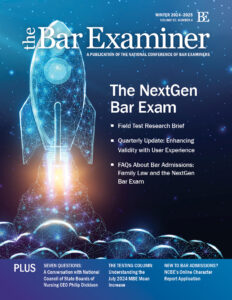What Is the UBE?
The Uniform Bar Examination (UBE) is prepared and coordinated by the National Conference of Bar Examiners to test knowledge and skills that every lawyer should be able to demonstrate prior to becoming licensed to practice law. It is composed of the Multistate Essay Examination (MEE), two Multistate Performance Test (MPT) tasks, and the Multistate Bar Examination (MBE). It is uniformly administered, graded, and scored by user jurisdictions and results in a portable score.
The UBE is administered over two days, with the MBE given on the last Wednesday of February and July and the MEE and MPT given on the Tuesday prior to that. The MEE and MPT scores are scaled to the MBE, with the MBE weighted 50%, the MEE 30%, and the MPT 20%.
Jurisdictions that use the UBE continue to
- decide who may sit for the bar exam and who will be admitted to practice.
- determine underlying educational requirements.
- make all character and fitness decisions.
- set their own policies regarding the number of times candidates may retake the bar examination.
- make ADA decisions.
- grade the MEE and MPT.
- set their own pre-release regrading policies.
- assess candidate knowledge of jurisdiction-specific content through a separate test, course, or some combination of the two if the jurisdiction chooses.
- accept MBE scores earned in a previous examination or concurrently in another jurisdiction for purposes of making local admission decisions if they wish. Note: candidates must sit for all portions of the UBE in the same UBE jurisdiction and in the same administration to earn a portable UBE score.
- set their own passing scores.
- determine how long incoming UBE scores will be accepted.
- maintain the security of test content and provide appropriate testing conditions by administering the UBE at specified times and in accordance with the rules laid out in the NCBE Supervisor’s Manual, including the guidelines for room setup, book distribution, seating charts, and proctor selection and training.
To ensure that candidates are assessed consistently across jurisdictions, UBE jurisdictions will
- administer the entire examination (MEE, MPT, and MBE) to each UBE candidate in the same administration. Banked, transferred, or concurrent MBE or written scaled scores earned in a prior examination or concurrently in another jurisdiction may not be used in calculating UBE total scores.
- grade the MEE and MPT using generally applicable rules of law rather than jurisdiction-specific law.
- train and calibrate their MEE and MPT graders to follow uniform standards applied by all UBE jurisdictions.
- have NCBE perform the scaling of the MEE and MPT scores to the MBE to ensure that score calculations are
performed consistently across jurisdictions. - agree that, to qualify as UBE scores, the scores will not be changed after examination results have been announced.
- report on their test administrations and permit occasional audit by NCBE to verify that best practices are being
followed.
To facilitate score portability and transfers, UBE jurisdictions will
- generate a UBE total score expressed as a whole number on a 400-point scale.
- accept transferred UBE scores that meet their passing standard whether or not the score meets the passing standard in the testing jurisdiction.
- require candidates to provide sufficient information on the MBE answer sheets to identify their scores for transfer by NCBE, including the candidate’s name, date of birth, NCBE Number, and the last four digits of the Social Security number.
- submit all UBE scores to a central registry maintained by NCBE to ensure that a full score history is reported by NCBE to receiving jurisdictions when candidates request UBE score transfers.
- provide, or have NCBE provide, candidates with their written scaled scores, MBE scaled scores, and UBE total scores so that candidates can determine if their scores are high enough to transfer to other jurisdictions.
Role of the Jurisdictions
Since the UBE’s inception, jurisdictions have been actively involved in shaping UBE policies and implementing best practices. Representatives from UBE jurisdictions regularly discuss administrative issues and make recommendations to NCBE’s Board of Trustees with respect to policy decisions related to the UBE. A representative from each UBE jurisdiction serves on NCBE’s Special Committee on the Uniform Bar Examination.








